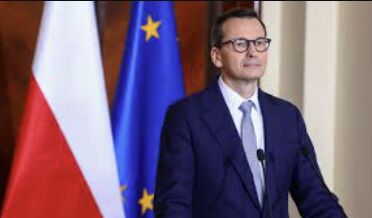Poland Halts Arms Shipment to Ukraine Amid Trade Dispute: What Does This Mean for Both Countries?
Poland's prime minister, Mateusz Morawiecki, announces the country will no longer send arms to Ukraine amid a trade dispute and pressure from a far-right party. This decision raises concerns about Ukraine's capabilities and Poland's reputation as a military aid advocate.
In a recent interview, Poland's prime minister, Mateusz Morawiecki, announced that the country will no longer be sending arms to Ukraine. This decision comes amidst a trade dispute between the two nations and pressure from the far-right Confederation party in Poland's upcoming national election. The prime minister stated that Poland is now focusing on arming itself with the most modern weapons as part of a military modernization plan driven by concerns of Russian aggression in the region. However, this decision raises questions about Poland's status as a major supplier of military equipment to Ukraine.
Poland has previously supplied Ukraine with a range of weaponry, including tanks and fighter jets. Despite Poland's withdrawal from sending more weapons, the government clarified that previously agreed-upon supplies of ammunition and armaments will continue. Nonetheless, this move has raised concerns about Ukraine's capabilities and the country's ability to maintain Western support in its war against Russian aggression. A leading security and defense expert, Michal Baranowski, highlighted the negative impact of this decision, stating that Poland's role as an advocate for military aid to Ukraine is now compromised.
Emotions have been running high between the two countries, especially after Poland, Hungary, and Slovakia implemented a ban on Ukrainian grain imports to protect their farmers from a surplus of Ukrainian grain in their markets. This decision further fueled tensions and led to a complaint filed by Ukraine at the World Trade Organization. Ukrainian President Volodymyr Zelenskyy even suggested that the countries opposing Ukraine on grain imports are working on Russia's behalf. Poland promptly summoned the Ukrainian ambassador to address this issue.
However, despite Poland's decision to cease arms transfer, the government maintains that it will not threaten Ukraine's security. Additionally, the NATO and U.S. hub in the Polish city of Rzeszow, which is crucial for transporting weapons into Ukraine, will not be affected. The United States also expressed confidence in Poland's continued leadership and support for Ukraine, highlighting that each contributing country has its own domestic politics. Germany echoed this sentiment, emphasizing its commitment to supporting Ukraine politically, economically, and with humanitarian aid and weapons.
Overall, Poland's decision to halt arms transfer to Ukraine has implications for both countries, Ukraine's capabilities, and Poland's reputation as a key advocate for military aid. As the national election approaches, Poland's attempt to show toughness towards Ukraine must be understood in the context of the election campaign. However, both Poland's modernization of its own forces and continued support for Ukraine are not necessarily mutually exclusive. The ongoing trade dispute and tensions between the two countries will require careful diplomatic management to ensure the stability of the region and the continuation of support for Ukraine's fight against Russian aggression.




